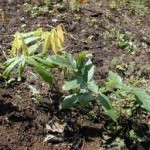Tubli (Derris) contains rotenone, a chemical that is toxic to insects and fish. Rotenone inhibits the respiratory process in the gills of fish.
The use of retonone to eliminate freshwater bodies of wild and stunted fish populations is common in the United States.
In the Philippines, dried and powdered tubli root offers a safer alternative to costly chemical pesticides in eliminating fish predators and competitors in brackish water fishpond.
In a test pond, 10 and 20 parts per million (ppm) of tubli fine root powder has been proven effective in killing unwanted species of fish and crustaceans in fishponds.
It has been found to be toxic to 14 species of fish but is tolerated by prawns up to 30 ppm. It has been used by some fishpond operators in the treatment of their fishponds.
“For lack of a better alternative, local fishpond operators have traditionally used insecticides and saponin from teaseed cake in pond management but these are imported and expensive,” said Dr. Rafael Guerrero, director of the Philippine Council for Aquatic and Marine Research and Development (PCAMRD).
Guerrero and colleagues at PCAMRD looked at the proper concentrations of tubli that is more suitable for local conditions. They found that fish exposed to the fine root powder at 10 and 20 ppm died faster than those treated with coarse powder at the same concentrations.
“Because of the environmental hazards and import constraints for insecticides and teaseed cake, there is a need for a safer and more practical alternative,” Guerrero said. “Tubli is feasible under local conditions because of its availability, practicality and safe features.” he added.
In Albay, Tubli roots were dried and chopped into 2 centimeter pieces and oven dried at 60 degrees centigrade and ground in a laboratory pulverizer. Coarse powder was produced using no. 15 sieve and for fine powder using no. 40 sieve.
In a 200 square meter earthen fishpond a total of 200 grams of tubli root fine powder is required in the treatment of the pond.
The tubli roots powder for fish control in ponds was recently presented by PCAMRD, it was funded by the Philippine Council for Agriculture, Forestry and Natural Resources Research and Development (PCARRD), Department of Science and Technology (DoST).
